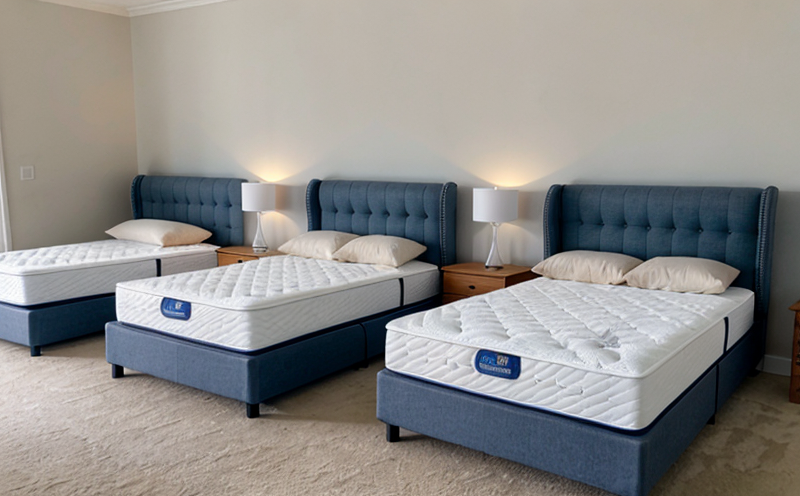ISO 9073 Nonwoven Mattress Materials Strength Testing
The ISO 9073 standard specifies methods for determining the tensile strength, tear resistance, and elongation of nonwoven materials used in mattress manufacturing. This service is crucial for ensuring that mattresses meet stringent quality control standards, thereby enhancing product performance and durability.
Nonwovens are versatile materials widely employed in bedding due to their excellent thermal insulation properties, breathability, and moisture resistance. The strength of these nonwoven fabrics directly impacts the overall quality and longevity of mattresses. Our testing ensures that each batch of mattress material adheres to international standards.
The process begins with careful sample preparation according to ISO 9073 guidelines. Specimens are cut from the fabric rolls in accordance with specified dimensions. The tensile strength is measured by pulling the specimen at a controlled rate until it breaks, while tear resistance tests assess how resistant the material is to tearing under specific loading conditions.
For accurate testing, we use state-of-the-art equipment that conforms to ISO standards. This includes high-precision tensile testers capable of applying forces up to 50 kN and automated specimen grips for consistent results. Our technicians are trained to operate these machines precisely, ensuring reliable data collection.
The results from our testing provide critical insights into the quality of nonwoven materials used in mattress manufacturing. These findings help manufacturers identify areas for improvement, optimize production processes, and ensure compliance with relevant international standards such as ISO 9073:2018. By adhering to these stringent protocols, we contribute significantly to maintaining high-quality mattresses that meet consumer expectations.
Our commitment to precision and accuracy extends beyond just the testing process. We offer comprehensive reports detailing our findings along with recommendations for enhancing material quality. This service not only supports compliance but also drives innovation within mattress manufacturing by providing actionable data based on rigorous scientific methods.
Scope and Methodology
The scope of ISO 9073 testing encompasses the mechanical properties of nonwoven materials used in mattress construction. Specifically, this includes tensile strength (TS), elongation at break (EAB), and tear resistance (TR). These parameters are essential for assessing the durability and performance characteristics of mattress components.
- Tensile Strength: Measured by applying a controlled force until the specimen breaks. This value indicates how much stress the material can withstand before failure.
- Elongation at Break: Represents the percentage elongation experienced by the material when it reaches its breaking point under tension.
- Tear Resistance: Assesses the ability of the fabric to resist tearing when subjected to a specific load. This property is crucial for ensuring that mattress layers remain intact during use.
The methodology involves precise sample preparation and testing procedures. Samples are cut from rolls following strict dimensions outlined in ISO 9073 specifications. Tensile tests follow a standardized procedure where the specimen is clamped between grips at both ends, then subjected to gradually increasing force until rupture occurs.
For tear resistance measurements, special fixtures are used to create defined cuts in the sample before applying tension until tearing begins or progresses beyond acceptable limits. All data points are meticulously recorded and analyzed using advanced software tools designed for statistical analysis.
Customer Impact and Satisfaction
The impact of ISO 9073 testing on mattress manufacturers is profound, as it ensures consistent quality across production batches. By adhering to these international standards, companies can produce mattresses that meet both internal specifications and external regulatory requirements.
This service fosters customer satisfaction by delivering products that are reliable and long-lasting. Consumers trust brands that demonstrate commitment to quality through independent third-party verification such as our ISO 9073 testing services. Our clients benefit from reduced warranty claims due to premature failures, leading to enhanced brand reputation and increased market share.
Moreover, compliance with international standards like ISO 9073 enhances export opportunities for mattress manufacturers looking to penetrate global markets. Many countries have stringent requirements regarding the materials used in bedding products; meeting these criteria opens doors to lucrative foreign markets while maintaining domestic competitiveness.
Our clients also gain competitive advantages by differentiating their offerings through superior product quality. In an increasingly price-sensitive industry, being able to showcase adherence to rigorous testing protocols can set brands apart from competitors who may not prioritize such measures equally.
International Acceptance and Recognition
- ISO 9073 is internationally recognized as a benchmark for evaluating the mechanical properties of nonwoven materials in various applications, including mattress manufacturing.
- The standard has been adopted by numerous countries worldwide, making it a de facto global reference point for quality assurance in this sector.
- Compliance with ISO 9073 ensures that mattresses meet not only local but also international standards, facilitating smoother trade between different regions.
- This universal acceptance enhances trust among stakeholders involved in mattress production and distribution networks.





